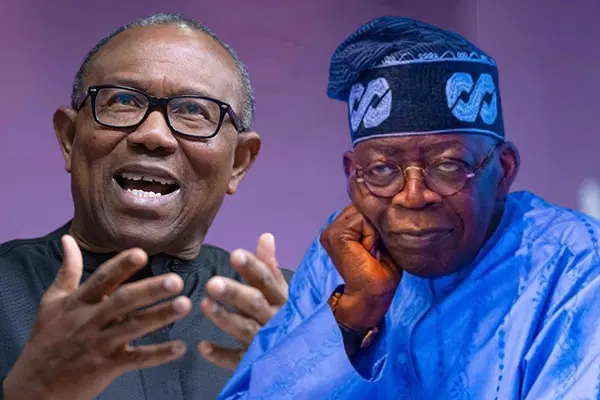Peter Obi Accuses Tinubu’s Government of Piling Up Debt Without Visible Development
Peter Obi, the 2023 Labour Party presidential candidate, has charged President Bola Tinubu with taking on excessive debt without producing the necessary infrastructure.
While expressing deep concern about Nigeria’s rising debt profile under the watch of President Tinubu, Obi lamented that this development could compromise the future of future generations and worsen the living conditions of millions of citizens.
The Nigerian Senate recently approved an additional $21 billion, €2.2 billion, and ¥15 billion in external borrowing for the 2025–2026 fiscal cycle, along with ₦750.98 billion in domestic bond issuance and a €65 million grant, according to a post made by the former governor of Anambra State on Tuesday via his 𝕏 account.
According to the most recent data, Nigeria’s overall debt is currently around ₦187 trillion, and there are worries that by the end of 2025, the country’s public debt could surpass ₦200 trillion.
The Nigerian Senate authorized an additional $21 billion, €2.2 billion, and ¥15 billion in external borrowing for the fiscal year 2025–2026 on July 22, 2025. Additionally, it authorized a €65 million grant and the issuing of N750.98 billion in domestic bonds. With an already existing public debt of about N149.39 trillion as at the first quarter of 2025, adding the approved loans of about N37.2 trillion) brings our current total debt to about N187 trillion with concerns that our debt might likely be over N200 trillion by the end of 2025.
Given that our GDP was approximately N269.2 trillion (almost $180 billion) before to rebasing, the government has borrowed almost 70% of that amount. The government would have borrowed almost 50.16 percent of the new GDP (with the approved loans), the greatest debt-to-GDP ratio in our country’s history, even after the rebasing, which increased our GDP to nearly N372.8 trillion (about $243. 7 billion).
We are building up extremely high levels of unsustainable debt with little to show for it in vital areas like healthcare, education, electricity generation, property and life security, and lifting people out of poverty, even though the year-over-year and quarter-over-quarter increases are roughly N27.72 trillion and N4.72 trillion, respectively.
Read Also: I’m Living Testimony Of Robust Mentorship – Ajulo, Ondo AG
“We continue to score poorly on every important human development metric. Millions of Nigerians, especially the impoverished, still lack access to healthcare, while education is underfunded and standards are steadily declining. Despite a huge rise in security spending from N2.98 trillion in 2023 to N4.91 trillion in 2025, the protection of lives and property has deteriorated, with almost 10,217 persons slain and 672 communities sacked between May 29th, 2023, and May 29th, 2025. Approximately 135,000 kilometers of our 195,000 kilometers of roads are still unpaved, mostly impassable, and useless due to ongoing infrastructure deterioration throughout the nation. It is the same gloomy condition in practically all sectors of the economy, with the power industry an obvious example, with less than 5,000 MW supplied for over 200 million Nigerians.
“We are still facing depressing news of growing poverty, with approximately 133 million (63%) Nigerians classified as multi-dimensionally poor, rising unemployment, and tragic news like 652 children dying as the malnutrition crisis worsens in Northern Nigeria, more than two years after the current government took office and with all the enormous borrowing.
Doctors Without Borders, or Médecins Sans Frontières (MSF), has raised the alarm about a growing malnutrition epidemic in Northern Nigeria, citing Katsina State as one of the most affected regions.
“Despite the abundance of riches in this nation, no one should go to bed hungry. However, the majority of our folks are now living in multifaceted poverty due to a prolonged lack of leadership,” he remarked.
Although borrowing might not be entirely bad if it is used for high-impact, productive projects with clear and quantifiable results, Peter Obi concurred that the administration of President Bola Tinubu has not demonstrated any evidence of fiscal management and has not provided an explanation for the massive borrowings.
He urged for economic reform, pushing the government to minimize unnecessary spending, halt income leakages, and prioritise investments in human capital.
If borrowing is sustainable and linked to profitable ventures with quantifiable results, it is not intrinsically harmful. Regretfully, the present trend of borrowing without transparency, accountability, or transformative impact is merely mortgaging our children’s future. The government should show at least some regard and interest in the future of young and unborn Nigerians, as well as take into account the intergenerational effects of their unsustainable borrowing.
“We must return to a disciplined and prudent economic management culture, cutting the cost of governance, blocking leakages, investing in human capital, and building a productive economy. Nigeria cannot keep taking on debt carelessly as poverty increases and public confidence declines.
“This budgetary irresponsibility must end now. To achieve sustainable and inclusive development and growth, we must create a New Nigeria where people are at the center of development, leadership is accountable, and every kobo borrowed or spent has a quantifiable impact.
He came to the conclusion that “a new Nigeria is possible.”

